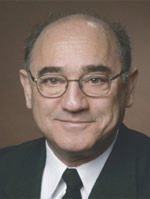 Alexander Pines is the Glenn T. Seaborg Professor of Chemistry at the University of California, Berkeley, and Senior Scientist in the Materials Sciences Division of the Lawrence Berkeley National Laboratory. He was born in 1945, grew up in Rhodesia (now Zimbabwe) and went to Israel for his undergraduate work in mathematics and chemistry. He came to the United States in 1968, obtained his PhD in chemical physics at M.I.T. in 1972 and then joined the Berkeley faculty and was also invited after some years to join the Lawrence Berkeley Laboratory.
Alexander Pines is the Glenn T. Seaborg Professor of Chemistry at the University of California, Berkeley, and Senior Scientist in the Materials Sciences Division of the Lawrence Berkeley National Laboratory. He was born in 1945, grew up in Rhodesia (now Zimbabwe) and went to Israel for his undergraduate work in mathematics and chemistry. He came to the United States in 1968, obtained his PhD in chemical physics at M.I.T. in 1972 and then joined the Berkeley faculty and was also invited after some years to join the Lawrence Berkeley Laboratory.
Pines is a pioneer in the development and applications of nuclear magnetic resonance (NMR) spectroscopy, initially interested primarily in solids. Together with the great John S. Waugh, he demonstrated time-reversal of dipole-dipole couplings in many-body spin systems, and introduced high sensitivity, high resolution NMR of dilute spins such as carbon-13 in solids (proton-enhanced nuclear induction spectroscopy), thereby helping to launch the era of modern solid-state NMR in chemistry.
His current program is composed of two complementary components. The first is the establishment of new concepts and techniques in NMR and MRI, in order to extend their applicability and enhance their capability to investigate molecular structure, organization and function from materials to organisms. The second component of his research program involves the application of such novel methods to problems in chemistry, materials science, and biomedicine.
Many of the concepts, methodologies, and instrumentation emanating from Pines’ research continue to be adopted worldwide by research groups in academia, federal laboratories and industry, and are being used to investigate molecular structure and organization from the nanoscale dimensions of catalysts and polymers to the macroscopic proportions of human imaging and oil exploration. In terms of education and training, hundreds of scientists (the self-dubbed “Pinenuts”) have passed through the lab, and many now hold leading research and teaching positions worldwide.
Among his many prestigious awards and honors, Pines has received the Langmuir Medal of the American Chemical Society and the Faraday Medal of the Royal Society of Chemistry. He is a member of the U.S. National Academy of Sciences, and a Foreign Member of the Royal Society (London); he is Doctor Honoris Causa at the University of Paris and the University of Rome, and past President of the International Society of Magnetic Resonance. He was awarded the Wolf Prize for Chemistry (together with Richard R. Ernst) in 1991. Pines has also been recognized by numerous teaching honors, including The University of California’s Distinguished Teaching Award.